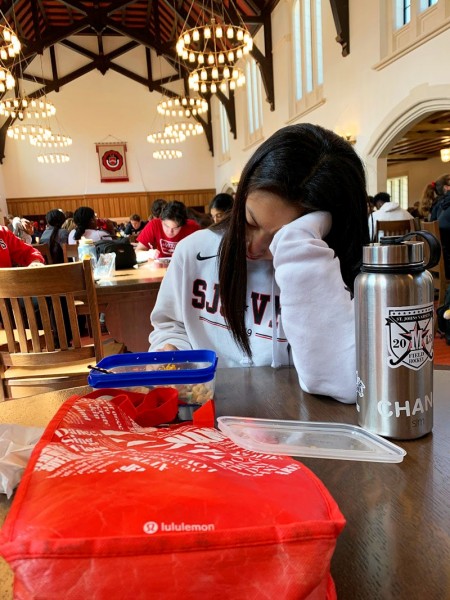Are You Getting Enough Sleep?

Candice Alfano, Ph.D., Professor of Psychology and Director of Sleep and Anxiety Center of Houston, recently talked to Upper School students at an assembly. Based on the recent Challenge Success Survey, SJS upper school students reported 6.9 hours of sleep per night in comparison to the recommended 9.25 hours per night. Only 3.6 percent of our students are getting the needed amount of sleep during the week.
“I think have haven't gotten nine hours of sleep all of high school.” sophomore Lucy Haire said. “I usually get around six.”
Did you know that we spend 1/3 of our lives asleep? Or, that our brain waves are as active during sleep as they are when we are awake? Certain critical biological processes only occur while we sleep, such as the release of growth hormones.
Studies have further shown that inadequate sleep is linked to health issues such as suppression of our immunological system, and increases in the occurrence of common colds and viruses. In addition, inadequate sleep is linked to delays in healing injuries, irregular heartbeats, high blood pressure and heart attacks.
It is not just an issue for physical health issues but also mental health problems. If we don’t get enough sleep, we tend to have greater anxiety, reduced motivation, a higher rate of irritability and less empathy for others.
Alfano also mentioned that athletes suffer from lack of sleep as it affects their coordination and balance, reaction time, hand-eye coordination, fine motor skills and their stamina; athletes put more wear on their muscles and tissues. While we are sleeping, our bodies give the tissue time to repair. Studies have also shown that athletes who get more sleep are more likely to increase their speed and high-intensity workouts.
Lack of sleep not only affects us over time but it is also attributed to instant decisions, which may prove to be fatal. An article published in the Oxford University Press noted that people who slept for fewer than seven hours had much higher odds of being involved in and responsible for car crashes. It went on to say that an estimated seven percent of all motor vehicle crashes in the U.S. and sixteen percent of fatal crashes involve driver drowsiness.
So how do you know if you are sleep deprived? Is it difficult to wake up in the morning? Does it take you a long time to wake up? Are you late to morning classes? Is your sleep on weekends much greater than your sleep during the week? If you answered yes to any of the above then you are most likely sleep deprived.
In closing, Dr. Alfano left students with tips on how to improve the amount of sleep we get each night. Only take short naps of 20 minutes at a time, cut out caffeine after noon, try and stick with a regular bedtime, avoid catch up sleep on the weekends, turn off electronics one hour before bed and make sleep a priority. SJS students strive to follow these tips in order to maximize their amount of sleep each night.
Want more buzz like this? Sign up for our Morning Buzz emails.
To leave a comment, please log in or create an account with The Buzz Magazines, Disqus, Facebook, or Twitter. Or you may post as a guest.



